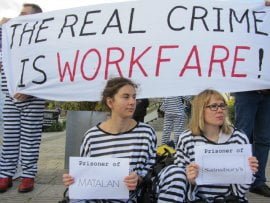The Coalition has suffered a defeat in its war against benefit claimants at the hands of a recent university graduate and an unemployed HGV driver, after the Court of Appeal declared the ‘workfare’ schemes currently being enforced by the government to be illegal. This ruling by the Court has exposed the desperation and instability of this Tory-led government, and highlighted the brutal policies that they are attempting to carry out. Ben Gliniecki reports.
The Coalition has suffered a defeat in its war against benefit claimants at the hands of a recent university graduate and an unemployed HGV driver, after the Court of Appeal declared the ‘workfare’ schemes currently being enforced by the government to be illegal. This ruling by the Court has exposed the desperation and instability of this Tory-led government, and highlighted the brutal policies that they are attempting to carry out.
The essence of ‘workfare’ schemes is that people claiming Jobseeker’s Allowance (JSA) can be offered schemes by participating employers, which consist of full time work for a period of some months, and which are completely unpaid except for the JSA. Once accepted, the worker is not allowed to leave the scheme until it is completed on pain of losing their JSA. In the case of one of these claimants he was expected to work 30 hours a week for six months being paid just £2.37/hour.
The effect of schemes like this is to further drive down wages, which are already at rock bottom, providing businesses with free labour and increased profits at the expense of the living standards of those working. One of the claimants in this case was forced to give up voluntary work in the museum sector, where she ultimately wanted to work, in order to carry out unpaid labour at Poundland and keep her JSA.
The desperation of the government in introducing this scheme was highlighted by the Court of Appeal. The Court ruled against the government because the regulations implemented to govern the details of the workfare schemes were poorly drafted and illegal on the basis of legislation passed in 1995. Such amateurish errors of basic lawmaking reflect the desperation of a cabinet of millionaires tripping over themselves in a rush to divide the working and unemployed people amongst themselves so that they can make the most vulnerable in society pay for this crisis.
The government are clearly worried. The structure of the scheme was such that most of the details of the scheme that really mattered could have been changed at will by cabinet ministers without any need to consult Parliament. This was something the Court was not willing to accept. The Coalition was too afraid to publicly air the gory details of the extent of the misery being inflicted upon working people by these ‘workfare’ schemes.
The instability of the Coalition was on display in this judgement. The judges refer to a report from the House of Lords that states that it is concerned by the regulations governing the ‘workfare’ schemes. This report points to the undemocratic nature and poor wording of the regulations. This report should be viewed in the context of the distancing from and criticism of ‘workfare’ schemes by a number of employers following public pressure over the issue. Clearly the ruling class in Britain is divided over the appropriate severity of attacks on working and unemployed people. Such divisions weaken the Coalition and the ruling class as a whole.
We should welcome this judgement from the Court of Appeal, which exposes the weakness of the ruling class and the their programme of austerity. But we must also realise that this judgement will not stop the attacks on working and unemployed people. One of the judges said “I emphasise that this case is not about the social, economic, political or other merits of the Employment, Skills and Enterprise Scheme”. The Court refused to denounce the ‘workfare’ schemes as in breach of human rights and said that the idea of withholding JSA from people unless they carried out unpaid work was actually a good one in principle but that it had been incorrectly implemented in this instance.
Workers and the unemployed cannot put their trust in judges earning £200,000 per year to adequately protect their interests. Ordinary people can only afford to have faith in themselves and their traditional organisations of struggle. As Marx wrote, “The emancipation of the working class is the task of the working class itself.”
If we are serious about fighting austerity we need to organise ourselves using the trade unions and the wider labour movement. That way we can do what the courts cannot, and address the social, economic and political injustices, not just of the ‘workfare’ scheme, but of the whole capitalist system. Victories in the courtrooms are but one weapon we can use to struggle against benefit cuts and other austerity measures. If we are serious about making the bosses pay for this crisis then the only option is for a mass movement of workers and youth to fight for an economic and political transformation of society.






